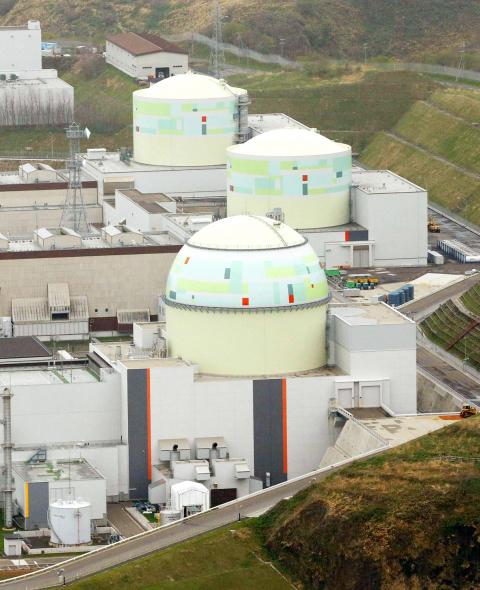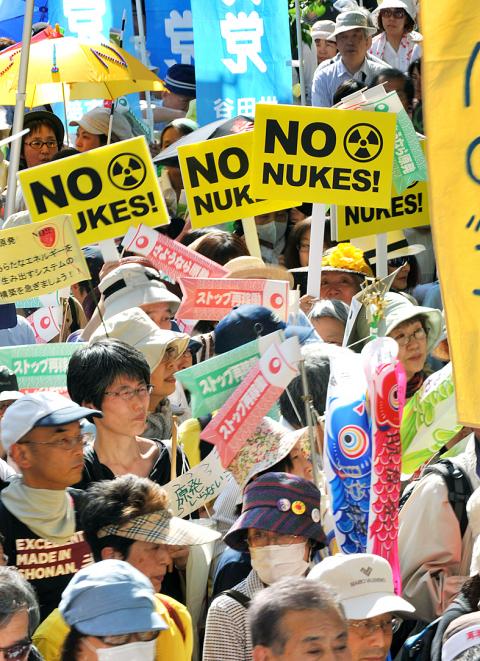A Japanese power firm began switching off the country’s last working reactor, leaving it without nuclear power just over a year after the world’s worst atomic accident in a quarter of a century.
As technicians close down the No. 3 unit at Tomari in Hokkaido, the debate over whether Japan needs nuclear power has been reignited, amid increasingly shrill warnings of summer power blackouts.
Hokkaido Electric Power, which runs the plant, said they started inserting control rods at 5pm that would halt the chain reaction and bring the reactor to “cold shutdown” sometime on Monday.

Photo: Reuters
“Power output started declining at the No. 3 unit,” said Tomohiko Shibuya, a Hokkaido Electric Power spokesman. “We have not heard of any trouble so far. Power generation there is scheduled to stop completely in about six hours.”
The shuttering will mark the first time since the 1970s that resource-poor and energy-hungry Japan has been without nuclear power, a technology that had provided a third of its electricity until meltdowns at the Fukushima Dai-ichi nuclear power plant after the earthquake and tsunami disaster in March last year.
“A new [era in] Japan with no nuclear power has begun,” said Gyoshu Otsu, a 56-year-old monk who joined a protest against nuclear power in front of the industry ministry in Tokyo which supervises the nation’s power utilities.

Photo: AFP
“Generating nuclear power is like a criminal act as a lot of people are still suffering,” said Otsu, wearing white Buddhist clothes.
“If we allow the situation as it is now, another accident will occur,” he added.
Protest organiser Masao Kimura said: “It’s a symbolic day today. Now we can prove that we will be able to live without nuclear power.”
Separately, about 5,500 demonstrators staged a rally at a park near Tokyo Tower and later marched through central Tokyo carrying banners which read: “Sayonara [Goodbye], nuclear power.”
“We have to take action now, so that Fukushima should be the last nuclear accident not only in Japan, but all over the world,” Mizuho Fukushima, head of the opposition Social Democratic Party, said during the rally.
When power generation stopped late yesterday, Japan’s entire stable of 50 reactors would be offline, despite increasingly urgent calls from the power industry and bodies like the Organisation for Economic Cooperation and Development, who fear dire consequences for the world’s third-largest economy.
Last month, Kansai Electric Power, which supplies mid-western Japan, including the commercial hubs of Osaka, Kyoto and Kobe, said a hot summer could see supply fall nearly 20 percent short of demand.
Kyushu Electric Power, covering an area further west, and Hokkaido Electric Power also said they would struggle as air conditioning gets cranked up in Japan’s sweltering summer.

Tropical Storm Gaemi strengthened into a typhoon at 2pm yesterday, and could make landfall in Yilan County tomorrow, the Central Weather Administration (CWA) said yesterday. The agency was scheduled to issue a sea warning at 11:30pm yesterday, and could issue a land warning later today. Gaemi was moving north-northwest at 4kph, carrying maximum sustained winds near its center of up to 118.8kph and gusts of 154.8kph. The circumference is forecast to reach eastern Taiwan tomorrow morning, with the center making landfall in Yilan County later that night before departing from the north coast, CWA weather forecaster Kuan Shin-ping (官欣平) said yesterday. Uncertainty remains and

SEA WARNING LIKELY: The storm, named Gaemi, could become a moderate typhoon on Wednesday or Thursday, with the Taipei City Government preparing for flooding A tropical depression east of the Philippines developed into a tropical storm named Gaemi at 2pm yesterday, and was moving toward eastern Taiwan, the Central Weather Administration (CWA) said. Gaemi could begin to affect Taiwan proper on Tuesday, lasting until Friday, and could develop into a moderate typhoon on Wednesday or Thursday, it said. A sea warning for Gaemi could be issued as early as Tuesday morning, it added. Gaemi, the third tropical storm in the Pacific Ocean this typhoon season, is projected to begin moving northwest today, and be closest to Taiwan on Wednesday or Thursday, the agency said. Today, there would likely

DISRUPTIONS: The high-speed rail is to operate as normal, while several airlines either canceled flights or announced early departures or late arrivals Schools and offices in 15 cities and counties are to be closed today due to Typhoon Gaemi, local governments announced last night. The 15 are: Taipei, New Taipei City, Taoyuan, Tainan, Keelung, Hsinchu and Kaohsiung, as well as Yilan, Hualien, Hsinchu, Miaoli, Chiayi, Pingtung, Penghu and Lienchiang counties. People should brace for torrential rainfall brought by the storm, with its center forecast to make landfall on the east coast between tonight and tomorrow morning, the Central Weather Administration (CWA) said. The agency issued a sea warning for the typhoon at 11:30pm on Monday, followed by a land warning at 11:30am yesterday. As of

CASUALTY: A 70-year-old woman was killed by a falling tree in Kaohsiung as the premier warned all government agencies to remain on high alert for the next 24 hours Schools and offices nationwide are to be closed for a second day today as Typhoon Gaemi crosses over the nation, bringing torrential rain and whipping winds. Gaemi was forecast to make landfall late last night. From Tuesday night, its outer band brought substantial rainfall and strong winds to the nation. As of 6:15pm last night, the typhoon’s center was 20km southeast of Hualien County, Central Weather Administration (CWA) data showed. It was moving at 19kph and had a radius of 250km. As of 3pm yesterday, one woman had died, while 58 people were injured, the Central Emergency Operation Center said. The 70-year-old